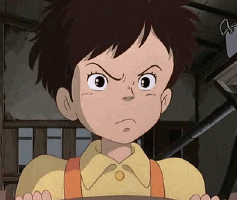I think one childhood development specialist summed it up perfectly when he opined, “All toddlers are basically sociopaths.”

Now, some may balk (understandably) at this comparison. Trust me, they either don’t have children or they’re the type of parents who prepare photo catalogues of their children’s lunch boxes and cheerfully dismiss little Tonya’s penchant for smacking her baby sister as a “personal expression of personal space and an exploration of physical prowess.” Well, my Pinterest-obsessed friend, let me reassure you that not only is your darling angel an asshole, but she’s totally normal.
I mean, think about it. These little bundles of joy are exploding from within, their bodies growing, stretching and straining in every direction, while a cacophony of information is mainlined into their developing brains faster than a sugar rush from licking Tang crystals from the Tupperware jug.
.gif)
Not that I’ve ever done that. Okay once. My tongue looked like Paris Hilton’s fake tan for a week.
Sadly, this information is fed into a completely different part of their brains than the idea that babies may not make the most ideal punching bags. So just to recap: they’re getting stronger and smarter, but not necessarily nicer.
Don’t get me wrong. I’ve loved my son since he arrived, aged 14 months, at our happy home. I loved him when he smiled at me for the first time; I loved him when he pitched tantrums that made subway trains seem positively quiescent. Hell, I even loved him when he barfed curdled milk directly into my mouth.

Let me just repeat that for a moment while it sinks in.
Into. My. Mouth.
.gif)
Exactly.
But teaching empathy is just like teaching a kid to crap in the toilet. It needs time, effort and nerves of steel. It’s here that I believe television can be quite a useful tool. And yes I do realize that just saying that out loud may cause a Montessori parent to physically explode, leaving a theoretically unstable anomaly in the time/space continuum that can be healed only with judicious application of echinacea tincture and sombre readings from the Baby Einstein bible.
But the right shows really can help kids realize that their actions have consequences and that other people have feelings, too. Thomas the Tank Engine is a great example of this. Each show, one of the little trains gets itself into some sort of trouble, and the rest of the episode is dedicated to identifying the problem and making it right. I fucking love that.
I also love shows like Sesame Street, where kids’ emotions are talked about in an easy-to-understand manner, with lots of colour and fun mixed in for good measure. Plus, just try to look at Big Bird’s face and not feel happy.

A lot of parents really are against any sort of television for kids. I totally get that. We don’t have cable in our house, so the only shows that Pre-Schooler N sees are ones that we watch together, chosen from DVDs or the kids section of Netflix (an excellent resource for any parent, by the way). And I’m the first to agree that real-life modelling, books, play and talking are the best route to creating a healthy sense of self-esteem and compassion in wee viewers. Growing up with shows like The Smurfs, Super Friends and Scooby-Doo, I was given the benefit of entertainment and imagination, free of violence and serious conflict, with lots of lessons about sharing, honesty and helping others.
Now it also may be responsible for my lingering attraction to Shaggy, but that’s utterly beside the point. Although . . . just try to tell me that THIS isn’t the absolute definition of male hotness ever:

Oh shut up. He’s a mystery, wrapped in an enigma, shrouded in smouldering sex appeal and dressed like a god.
Yes, I’m serious.
Oh go to hell all of y’all.
.gif)
 Why you can trust Xtra
Why you can trust Xtra


